Duitse schrijver Stefan Andres werd geboren op 26 juni 1906 in Breitwies bij Trier. Zie ook mijn blog van 26 juni 2007 en ook mijn blog van 26 juni 2008 en ook mijn blog van 26 juni 2009 en ook mijn blog van 26 juni 2010.
Uit: Wir sind Utopia
„Das braune, eintönige Plateau lag unter der jeden Tag gleich wiederkehrenden Sonne zerpulvert da, und um das Gefährt, das in den sanften Senkungen des Weges verging und wieder hügelan strebte, hatte sich eine so dichte Staubwolke gebildet, daß man nur an seiner Schnelligkeit, dem Benzingestank und dem nachmittäglich langen Schatten einen Lastkraftwagen erkennen konnte. Wer aus der Ferne die knatternde, gelbe Wolke in der Einöde dahinkriechen sah, konnte die groteske Vor-
stellung haben, daß sich ein Stück des Weges erhoben und auf Wanderschaft begeben habe, um die rätselhafte Linie seines Auf und Ab und alle Windungen selber einmal zu verfolgen, in einem goldenen Federbusch dahinstäubend und eine lange, immer dünner und niedriger gleitende Schleppe hinter sich herziehend.
Aber es gab keinen Zuschauer. Die wenigen Bauernhäuser starrten mit schwarzen Fenstern ausgestorben in den Sonnenbrand, nur ein paar Hunde hoben gegen das sich nahende Monstrum aus Staub und Lärm die Nasen, duckten sich und sprangen in die versengten Felder, um dann wieder auf den leeren Weg zurückzukehren, an dessen Rand sie entlangsuchten, um bei einem umgewofenen Gepäckwagen und dem aufgedunsenen Körper eines Pferdes herumzuschnüffeln, zögernd und miteinander zankend, bis der Hunger ihren Abscheu vor dem Aas überwand.
Die Staubwolke aber kroch unentwegt in die Weite, und dort, wo auf der goldbraunen Höhe die ebenso braune Ringmauer einer im Mittelalter liegengebliebenen Stadt wie eine natürliche Felsenstufe sich erhob, verschwand sie unter dem Torbogen wie eine Lokomotive in einem Tunnel, und die Wachsoldaten unterm Tor sahen, wie auf dem Katzenkopfpflaster der Staub um den Wagen plötz-
lich verging und Bajonette hervorblitzten, ein eiserner Verhau um die wie aus Lehm gebackenen Gestalten, die auf dem offenen Lastwagen hockten und mit stumpfen Gesichtern den unerwarteten Schatten genossen und kaum den Kopf zu einem verstohlenen, flüchtigen Um- blick erhoben.”
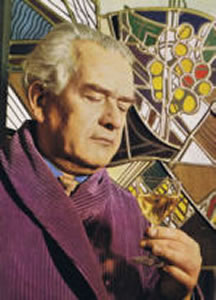
Stefan Andres (26 juni 1906 – 29 juni 1970)
De Deense schrijver Martin Andersen-Nexø werd geboren op 26 juni 1869 in Kopenhagen. Zie ook mijn blog van 26 juni 2007 en ook mijn blog van 26 juni 2009 en ook mijn blog van 26 juni 2010.
Uit:Die Passagiere der leeren Plätze (Vertaald door Ellen Schou en Karl Schodder)
„Wird unser Zeitalter etwa deshalb das eiserne genannt, weil die große Mehrheit von uns mit einer Kette ums Bein zur Welt kommen?
Ich gehörte selbst zu den unschuldig Ausgestoßenen, die, sobald sie kriechen können, den Reihen der Lebenssklaven eingekoppelt werden, deren verfluchtes Los es ist, einigen wenigen Auserwählten die Erde zu einem angenehmen Aufenthaltsort zu machen. Ab und zu wurde einer von uns ausgekoppelt und der Ewigkeit übergeben — billig und ohne Zeremonien; automatisch schloss sich die Reihe wieder, und wir anderen plackten uns zur Erde gebeugt weiter ab, während unsere ausgehungerten Seelen die Luft mit ihrem Geschrei erfüllten. Wie umherirrende Vögel kreisten sie über uns, ruhelos nach einem geschützten Brutplatz jagend. So zahlreich waren sie, dass sie die Sonne verdunkelten und selbst auf die lichtesten Gegenden der Erde Schatten warfen.
Eines Tages wurde ich als unbrauchbar ausgekoppelt — und auf freiem Felde zum Sterben zurückgelassen. Es meldete sich kein Arzt, obwohl ich noch gern ein bisschen gelebt hätte, aber ein schwarzer Pfaffe kreiste in bedenklicher Nähe um mich herum. Er wartete darauf, dass ich abkratzte, damit er meine Seele einfangen könnte. Zu seiner Entschuldigung muss gesagt werden, dass er vom Staat dazu abgerichtet worden war.
Die Beute entschlüpfte ihm aber; eine gutherzige Frau sammelte mich auf und brachte mich zu einem Arzt. „Tuberkulose!” sagte er. — „Und im übrigen verbraucht, ausgezehrt, von Geburt an unterernährt! Wie lange haben Sie gearbeitet?”
„Zwanzig Jahre.”
„Und wie alt sind Sie?”
„Vierundzwanzig.”
„Dann haben Sie ja eigentlich auch ausgedient.” „Ist gar nichts dagegen zu tun?” fragte die warmherzige Frau. „Ein Winter im Süden könnte ihn vielleicht retten. Sonst aber krepiert er.”
Das Wort „krepiert” gab mir einen Stich — im Grunde ziemlich sinnlos. Warum sich an Worte hängen, wenn die Bedeutung die gleiche ist? Und die ließ sich nicht missverstehen. In der Gesellschaft ist kein Organ vorhanden, das ein unschuldig zum Tode Verurteilter anrufen und um Begnadigung bitten kann. Verbrauchter und misshandelter Pferde nimmt die Polizei sich an, ein missbrauchter und vor der Zeit ausgenutzter Arbeiter hat nur den Himmel. Ich richtete mich ohne großes Widerstreben darauf ein, meine ausgehöhlten Lungen mit ewiger Seligkeit zu füllen.“
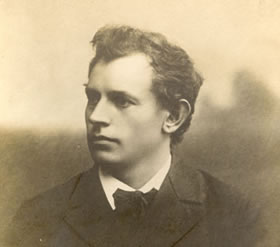
Martin Andersen-Nexø (26 juni 1869 – 1 juni 1954)
De Bengaals – Indische dichter, schrijver, essayiste en journalist Bankim Chandra Chatterjee werd geboren op 26 juni 1838 in Kanthalpura. Zie ook mijn blog van 26 juni 2007 en ook mijn blog van 26 juni 2009 en ook mijn blog van 26 juni 2010.
Uit: The Poison Tree (Vertaald door Miriam S. Knight)
„Nagendra was in a great strait. If, in fear of the storm, he should leave the boat, the men would think him a coward; if he remained he would break his word to Surja Mukhi. Some may ask, What harm if he did? We know not, but Nagendra thought it harm. At this moment Rahamat Mullah said, “Sir, the rope is old; I do not know what may happen. The storm has much increased;[6] it will be well to leave the boat.” Accordingly Nagendra got out.
No one can stand on the river bank without shelter in a heavy storm of rain. There was no sign of abatement; therefore Nagendra, thinking it necessary to seek for shelter, set out to walk to the village, which was at some distance from the river, through miry paths. Presently the rain ceased, the wind abated slightly, but the sky was still thickly covered with clouds; therefore both wind and rain might be expected at night. Nagendra went on, not turning back.
Though it was early in the evening, there was thick darkness, because of the clouds. There was no sign of village, house, plain, road, or river; but the trees, being surrounded by myriads of fireflies, looked like artificial trees studded with diamonds. The lightning goddess also still sent quick flashes through the now silent black and white clouds. A woman’s anger does not die away suddenly. The assembled frogs, rejoicing in the newly fallen rain, held high festival; and if you listened attentively the voice of the cricket might be heard, like[7] the undying crackle of Ravana’s funeral pyre. Amid the sounds might be distinguished the fall of the rain-drops on the leaves of the trees, and that of the leaves into the pools beneath; the noise of jackals’ feet on the wet paths, occasionally that of the birds on the trees shaking the water from their drenched feathers, and now and then the moaning of the almost subdued wind. Presently Nagendra saw a light in the distance. Traversing the flooded earth, drenched by the drippings from the trees, and frightening away the jackals, he approached the light; and on nearing it with much difficulty, saw that it proceeded from an old brick-built house, the door of which was open. Leaving his servant outside, Nagendra entered the house, which he found in a frightful condition.“
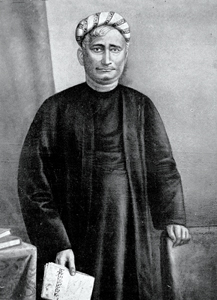
Bankim Chandra Chatterjee (26 juni 1838 – 8 april 1894)
De Thaise dichter Sunthorn Phu werd geboren op 26 juni 1786 in Bangkok. Zie ook mijn blog van 26 juni 2007 en ook mijn blog van 26 juni 2009 en ook mijn blog van 26 juni 2010.
Uit: Phra Aphai Mani (Vertaald door Prince Prem Burachat)
„ONCE upon a time, a certain prince whose name was Sudasna ruled over a small but prosperous country. He had two sons : the elder, fifteen years of age, was called Phra Abhai Mani, and the younger, aged thirteen, was called Sri Suvarna. Realising that they had reached years of discretion, and were ready to have knowledge instilled into them, so that they might later rule the principality rightly and justly, he summoned them into his presence and addressed them thus :
“My sons, one day you will rule over this country. It is meet that, like those princes of old, you should acquire knowledge which will enable you to protect your inheritance. So you must seek out learned men from whom you may receive instruction in such subjects as will be useful to you hereafter.”
The two young brothers bowed to their father, and signified their intention of obeying his will. After receiving further words of fatherly advice, they took their leave of him.
In those days, wise and learned men lived the lives of hermits, jealously guarding the treasures of their knowledge in the fastnesses of the forest or in the distant villages. By dint of much effort, and after fifteen days’ travel through the jungle, Phra Abhai Mani and Sri Suvarna succeeded in finding two ancient professors worthy of their consideration. One, as a notice on his door announced, taught the gentle art of flute-playing, and the other the sturdier science of self-defence. Phra Abhai Mani dicided without any hesitation that he would learn to play the flute, while Sri Suvarna chose self-defence. The only difficulty was that neither had brought with him the hundred thousand tamlueng of gold which each professor seemed to require in exchange for his instruction, (for in those days before there was popular education, teachers were entitled to demand their price!). However, on explaining the matter to the venerable old men, the latter kindly agreed to accept a ring of each as fee : they knew that the boys were of noble descent.“
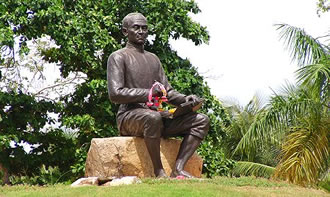
Sunthorn Phu (26 juni 1786 – ? 1855)
Standbeeld in Rayong
De Engelse dichter Branwell Brontë werd op 26 juni 1817 geboren in Thornton, Yorkshire. Zie ook mijn blog van 26 juni 2009 en ook mijn blog van 26 juni 2010.
Penmaenmawr (Winter 1845)
I knew a flower whose leaves were meant to bloom
Till Death should snatch it to adorn the tomb,
Now, blanching ‘neath the blight of hopeless grief
With never blooming and yet living leaf;
A flower on which my mind would wish to shine,
If but one beam could break from mind like mine:
I had an ear which could on accents dwell
That might as well say ‘perish’ as ‘farewell’ –
An eye which saw, far off, a tender form
Beaten, unsheltered, by affliction’s storm –
An arm – a lip – that trembled to embrace
My Angel’s gentle breast and sorrowing face
A mind that clung to Ouse’s fertile side
While tossing – objectless – on Menai’s tide!
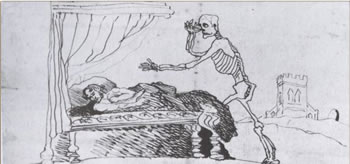
Branwell Brontë (26 juni 1817 – 24 september 1848)
Karikatuur van Branwell zelf, wachtend op de dood
De Amerikaanse toneel- en draaiboekschrijver Sidney Howard werd geboren op 26 juni 1891 in Oakland, Californië. Zie ook mijn blog van 26 juni 2007.
Uit: The Story Gets a Treatment
“If one goes to the root of the matter, motion pictures are neither written nor acted, but made. It is the combination of director with cameraman which, more than the writer, more even than the beloved screen personality, gives the finished picture its life. Apart from the original story material, the writer’s function in the making of pictures is a secondary one. Since the screen as we know it draws the vast bulk of its story material from books, periodicals and the stage – with a few imaginative excursions into biography – the screenwriter’s task is really a job of adaptation hack writing, cut to the dimension of the director’s demands. The screen does not yet ask of its writers much more than technical ingenuity.
In my opinion, novels make better pictures than plays. The playwright selects for his material a story which is most effectively told within the scenic limitations for the stage and is likely to suffer from over-elaboration on the screen. The screening of a play requires expansion, which is bad for a work of art. The screening of a novel, by contrast, requires contraction, which is apt to be good.
The motion-picture form lies somewhere between the novel and the play. It rejoices in at least the geographic freedom of the novel because it can move easily from place to place as a play cannot. However, the motion picture must do without the repose of either novel or play, and therefore without the reflective expansion of either idea or emotion. It has its own and most rigorous technique, which is best described by saying that a moving photograph must move and keep moving. In other words, its story, to be well told, must be told continuously in action. What the characters think or feel on the screen must be expressed by doing, and only strong and clear thoughts and emotions can be expected to pierce through a medium which, even in color, lacks the reality of the flesh and blood of the stage, on the one hand, and of the novelist’s personal spell on the other.“
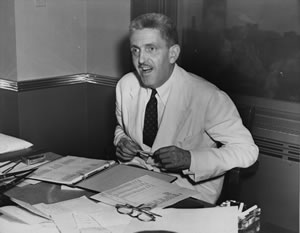
Sidney Howard (26 juni 1891 – 23 augustus 1939)
